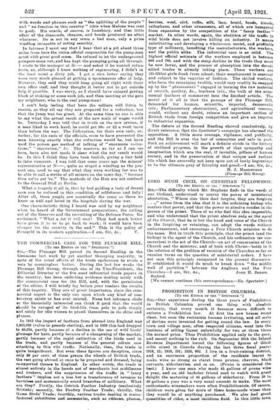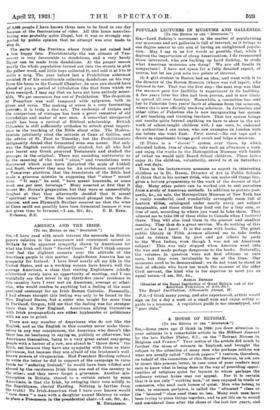PROHIBITION IN BRITISH COLUMBIA.
[To THE EDITOR or THE " SPECTATOR."l Sra,—Our experience during the three years of Prohibition in British Columbia proved one thing with absolute certainty, that every month it becomes more difficult to enforce a Prohibition law. At first the new broom swept clean, but soon the restraints became irritating, and all -sorts of devices were invented for getting round the law. In every town and village men, often respected citizens, went into the business of selling liquor unlawfully for two or three times the normal price. Thus Prohibition applied only -to the poor, and meant nothing to the rich. On September 30th the Inland Revenue Department issued the following figures of illicit stills seized in Canada during the last three fiscal years: 1918, 13; 1919, 191; 1920, 992. I live in a fruit-raising district, and an enormous proportion of the residents learnt to make wine as strong as claret from prunes, cherries, black currants, elderberries, and so on. (Prune is considered the best.) I know one man who made 45 gallons of prune wine a year, and an old bachelor friend used to watch with great delight the maturing of 40 gallons of elderberry. From 20 to 40 gallons a year was a very usual amount to make. The most enthusiastic winemakers were often Prohibitionists. Of course, children were given far more of these home-made -wines -than they would be of anything purchased. We also had great quantities of cider, a most insidious fluid. In this little town
of 8,090:people I have known three men to be fined in one day because of the fascinations of. cider. All this home manufac- turing was, probably quite illegal, but it was so strongly sup- ported by public opinion that no attempt was ever made to stop it.
The parts of the Province where fruit is not raised had a less happy fate. Providentially the wet climate of Van- couver is very favourable to dandelions, and a very heady liquor can be made from dandelions. At the proper season nearly the whole population turned out into the streets to pick the yellow weed, and little boys collected it, and sold it at 5 to 10 cents a mug. The year before last a Prohibition alderman counted 78 of his constituents collecting dandelions on his way from his home to the Council Chamber. In case you should have ahead of you. a period of tribulation like that from which we have emerged, I may say that we have not been entirely miser- able. We got enormous fun out of Prohibition. The despotism of Pussyfoot was well tempered with epigrams, both in prose and verse. The making of wines is a very fascinating pursuit; it is truly a fine art. The exchange of recipes and the comparison of vintages has been a great cementer of old friendships and maker of new ones. A somewhat unexpected result has been a revival of Biblical scholarship. British Columbia is still sufficiently orthodox to attach great import- ance to the teaching of the Bible• about wine. The Modera- tionists jubilantly cited the miracle at Cana of Galilee, and the advice of St. Paul to Timothy; but the Prohibitionists indignantly denied that fermented wine was meant. Not only was the English version diligently studied, but all who had ever learnt any Greek procured Testaments and studied the passages in the original. There was unending controversy as to the meaning of the word " oinos," and translations were discovered which must have disturbed the souls of Liddell and Scott, wherever they may be. An archdeacon asserted on a Vancoever platform that the translators of the Bible had made a grievous mistake in supposing that " oinos " meant wine. "It may," he said, " have meant lemonade, or some weak one per cent. beverage." Many asserted at first that it meant Mr. Bryan's grape-juice, but they were so unmercifully laughed at that they afterwards decided that it meant "spiritual wine." Even the unlearned plunged into the dis- cussion, and one. Plymouth Brother assured me that the wine at Cana could not possibly have been fermented.because it was not given time to ferment.—I am, Sir, &E., • R. B. Kznn. Kelotona, B.C.



































 Previous page
Previous page